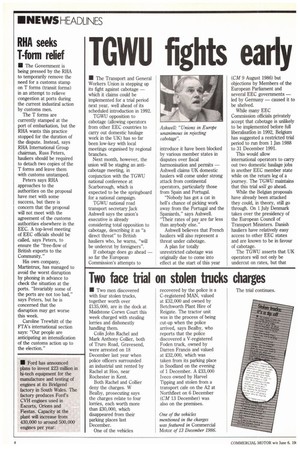TGWU fights early
Page 6

If you've noticed an error in this article please click here to report it so we can fix it.
• The Transport and General Workers Union is stepping up its fight against cabotage — which it claims could be implemented for a trial period next year, well ahead of its scheduled introduction in 1992.
TGWU opposition to cabotage (allowing operators from other EEC countries to carry out domestic haulage work in the UK) has so far been low-key with local meetings organised by regional branches.
Next month, however, the union will be staging an anticabotage meeting, in conjunction with the TGWU national conference at Scarborough, which is expected to be the springboard for a national campaign.
TGWU national road transport secretary Jack Ashwell says the union's executive is already considering total opposition to cabotage, describing it as "a direct threat" to British hauliers who, he warns, "will be undercut by foreigners".
If cabotage does go ahead — so far the European Commission's attempts to introduce it have been blocked by various member states in disputes over fiscal harmonisation and permits — Ashwell claims UK domestic haulers will come under strong attack from continental operators, particularly those from Spain and Portugal.
"Nobody has got a cat in hell's chance of picking work away from the Portugal and the Spaniards," says Ashwell. "Their rates of pay are far less than anybody else."
Ashwell believes that French hauliers will also represent a threat under cabotage.
A plan for totally unrestricted cabotage was originally due to come into effect at the start of this year (CM 9 August 1986) but objections by Members of the European Parliament and several EEC governments — led by Germany — caused it to be shelved.
While many EEC Commission officials privately accept that cabotage is unlikely to be implemented before full liberalisation in 1992, Belgium has suggested a restricted trial period to run from 1 Jan 1988 to 31 December 1991.
This would allow international operators to carry out two domestic haulage jobs in another EEC member state while on the return leg of a journey. The TGWU maintains that this trial will go ahead. While the Belgian proposals have already been attacked they could, in theory, still go through. On 1 July Denmark takes over the presidency of the European Council of Transport Ministers. Danish hauliers have relatively easy access to other EEC states and are known to be in favour of cabotage.
The TGWU asserts that UK operators will not only be undercut on rates, but that




































































































